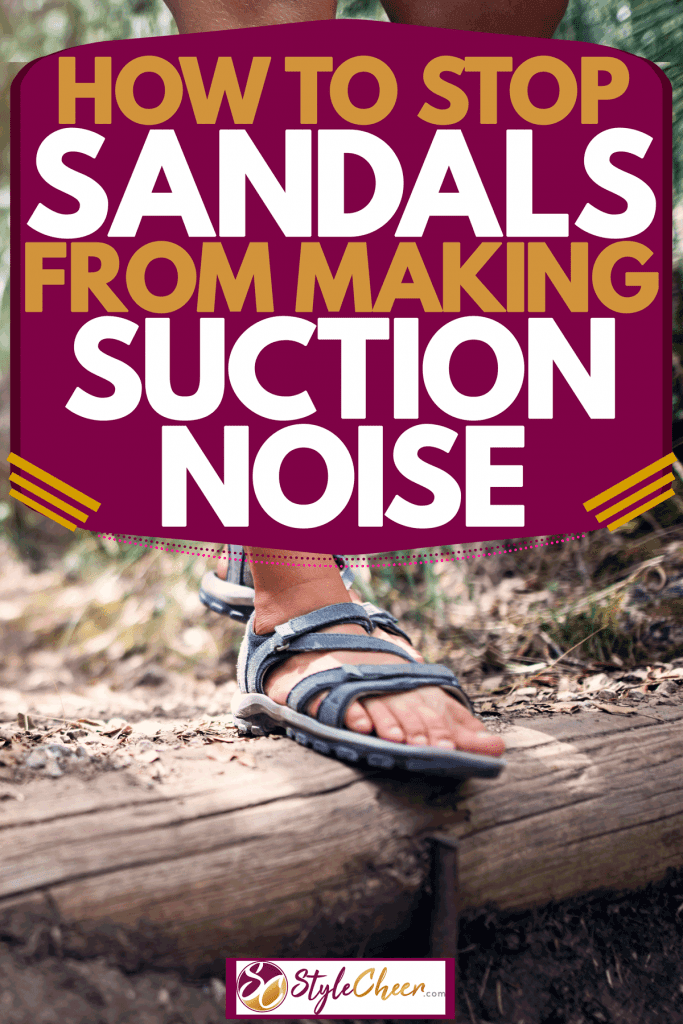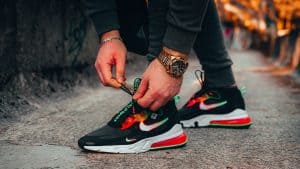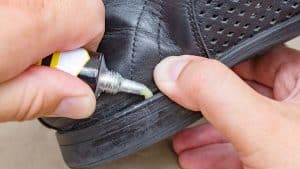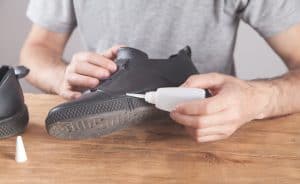You know you look great in your new pair of sandals. But as soon as you step out the door, you notice an annoying noise that you can't ignore. It's your sandals, and they sound like they're suctioned to your foot and are peeling off with each step. How can you get rid of that noise? We've researched the topic and have come up with the answer.
Here are the best ways to decrease the suction sound coming from your sandals:
- Use baby or talcum powder
- Apply waterproof shoe spray
- Use petroleum jelly
- Poke holes in the midsole
- Break them in
Nobody likes an embarrassing noise coming from their feet, which is why we've put together this guide to help you understand why that's happening and what to do about it. Let's get started!

This article may include affiliate links and elements that were carefully created by our team using advanced ai to help you envision the best style advice.
Why do sandals make a suction noise?
There are two main reasons why sandals make a suction noise. All of them are annoying, but all can be solved relatively easily! Be aware, though, that none of these problems may apply to your shoes. If that's the case, you might just need a new pair.
Air escaping from the cushioning
Do your suctioning sandals have heavy padding? If so, the air being squeezed out can often make an unattractive noise. The bottom of most sandals has three layers: the insole (the part your foot touches), the midsole (the padding area), and the outsole (the part that touches the ground).
If your sandal has a thick midsole and would call itself cushioned or padded, this is often made out of foam. When you step on the sandal, the air is pushed out of the foam, making the sound. This happens more often with new sandals since the cushion in them hasn't worn down as much as older shoes.
Friction with your foot
Another common problem is your foot rubbing against the insole of the sandal. When you take a step, your shoe stops before your foot does. When your foot keeps sliding, it slides against the sandal. Plus, if you're like most people, you wear your sandals when it's warm outside. Unfortunately, warm weather causes sweaty feet. The sweat and moisture can create even more friction, making the sound louder.
This noise, and when it occurs, depends on the material in the insole. Rubber and leather are stickier and more firm when they're new. After a while, the tackiness wears off, and your foot can slide silently. On the other hand, if your sandals' insoles are made out of suede, they'll get squeakier as they get older. When the fabric is worn thin, there's less to soften your foot's movement.
Damage
Naturally, shoes will take a beating. They're getting stepped on all day, after all! Sometimes sandals can be damaged, which might be contributing to the noise. For instance, if there's a hole in the cushioning that's letting the air escape, you'll be able to hear it. Or, if the bonding on the sole has failed, water may have entered.
How to stop sandals from making suction noise
The reasons described above need different treatments. Once you've figured out which problem applies to your shoes, then you can apply the solution.
Use baby or talcum powder
Since sweat is such a problem with noisy sandals, fight it by putting baby powder or talcum powder on your sandals' insole. This will quickly dry up the sweat, which will take away a lot of the friction. As an added bonus, your feet will feel fresh and clean.
Click here to view this talcum powder on Amazon.
Click here to view this baby powder on Amazon.
Apply waterproof shoe protector
Another way to eliminate sweat is to spray your shoes with a waterproof spray. This might be a great solution if your insoles are made out of suede or another soft material. There are waterproof sprays designed for almost all types of materials. Though this won't stop you from sweating, it will stop the sweat from penetrating the material.
Here are a couple of your best options:
Click here to view this spray on Amazon.
Click here to view this spray on Amazon.
Use petroleum jelly
If you're convinced that the noise doesn't only happen when your feet are sweaty, try putting a dab of petroleum jelly on the part of your sandal that rubs on your foot noisily. This will lubricate it and get rid of some noise. In particular, this is a useful step if your sandals have a leather insole. The jelly will loosen up the leather.
However, be careful with this choice because too much of the petroleum jelly can make your feet feel slimy. Put just a little bit of it on the sandal. Here are some options you can purchase today.
Click here to view this petroleum jelly on Amazon.
Click here to view this petroleum jelly on Amazon.
An alternative to petroleum jelly is WD-40, which is an oil-based lubricant. It will help with really tough noises, but be warned: it might damage your leather or suede insoles!
Click here to view this product on Amazon.
Poke holes in the midsole
If you're convinced that the problem is air being pushed, you can alleviate it by poking tiny holes in the midsole. Take a pin or other sharp, small object and poke one hole in the front, back, and both sides of the midsole. This will give the air more places to exit and will make your sandals quieter.
Break them in
This isn't necessarily the quickest option, but it's often important to simply break in your sandals. Since several of the possible problems come from the shoes still being new, wearing them often will get rid of it. If you're embarrassed to wear the noisy sandals in public, wear them around the house until the sound stops.
How do you break in sandals fast?
The classic way to break in a new pair of shoes is to wear them for short periods of time. If you're afraid they'll hurt your feet, stick to fifteen minutes of walking around a day. Over time, they'll feel more comfortable and won't be as noisy. There are faster options if you need them to be quiet quickly.
Though this might seem contrary to common sense, one way to break in your new sandals quickly is to dip them in water. Dry off the excess water with a towel, then walk around in them for fifteen minutes. The noise will probably be worse for those fifteen minutes, so do it when you have time to walk around your house.
The idea is that this will soften the sandal and help it form more closely to your foot. In the long run, this will reduce friction. Of course, if your shoes are made out of cork, suede, or other materials that are damaged by water, don't try this option. Don't attempt this if you aren't sure how the sandals will react with water!
In a similar vein, try heating up the sandals before wearing them. This, again, will help them form to your feet and be flexible. Use a blow dryer or put them in direct sunlight for an hour. Then, immediately put them on and walk around for a while. Want more details on how to break in your sandals? This article can help: "How To Stretch Sandals Wide?"
How do I stop my Birkenstocks from squeaking?
The insoles of a pair of Birkenstocks are made out of suede and cork. With this in mind, you should be careful with how you treat them. Don't dip them in water, as the cork will absorb it and be damaged irreparably. Similarly, don't use WD-40 or other chemical elements on the insole.
Instead, stick to talcum or baby powder. This will dry your feet without damaging the sandal. Also, realize that sometimes when suede gets worn out, it makes more of a sound. It might be time to buy a new pair of Birks!
Click here to view these sandals on Amazon.
Click here to view these sandals on Amazon.
Birkenstocks are also made out of leather. If you own a pair of Birks, you might be curious about how to take care of them. Check out this article for more details: "Can I Wash My Leather Sandals?"
How do you walk quietly in flip flops?
Maybe the problem with your noisy shoes isn't about the shoe, but rather how you walk in them. If you're sick of your flip flops making a flip flop noise, try landing each step with your heel hitting the ground first. The slapping sound comes when the back of the sandal pops off the ground and hits your heel.
In Closing
Your sandals might be making suction sounds because of air escaping from the cushion, friction with your foot, or damage to the sandal. Once you know what the problem is, try using talcum powder, shoe protector, petroleum jelly, poking holes in the midsole, or breaking them in. We hope this article solves your noisy shoe problem. Good luck!












